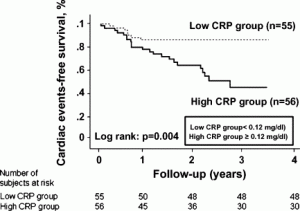When the Time Magazine devotes 7 full pages in the March 22, 2004 issue to the topic of inflammation as the source of most of the diseases of the Western World, you know that something important is happening in medicine. Christine Gorman and Alice Park have summarized some of the groundbreaking research of the past few years in this article. I will report about this article here, but also include direct links regarding some of the relevant research the authors have mentioned including some of the key links regarding the metabolic syndrome, which was not mentioned in the article.
Since the beginning of the obesity wave in North America it has become obvious that a cluster of diseases such as heart attacks, strokes, Alzheimer disease, cancer of the colon, multiple sclerosis, arthritis and others have also become more frequent. Dr. Paul Ridker, a cardiologist at Brigham and Women’s Hospital, was one of the pioneers of investigating inflammation as a possible cause and the common denominator of these diverse illnesses. He noticed that certain patients got heart attacks although their blood LDL cholesterol levels (the “bad” cholesterol) were normal. The theory at that time was that all patients who would develop heart attacks would come from a high-risk group of patients with elevated LDL cholesterol. The problem was that 50% of patients with heart attacks had normal LDL cholesterol levels. Dr. Ridker suspected that the C-reactive protein (CRP), which is found to be elevated in the blood of rheumatoid patients, would be somehow involved in the disease process of hardening of the arteries before a heart attack would occur. CRP is produced by the liver cells and by the lining cells of arteries in response to a general inflammatory reaction in the body. Examples of this would be rheumatoid arthritis patients and patients with autoimmune diseases, where CRP levels can be readily measured with a blood test. Dr. Ridker found that there was a very good correlation between the CRP level and the degree of inflammation as well as the risk for developing heart attacks and strokes. Further investigation by others confirmed that CRP levels were perhaps more important than LDL levels in predicting impending heart attacks. This is so, because CRP is the body’s substance in the blood stream that would be responsible for breaking up LDL containing deposits (plaques) in the walls of the arteries, which leads to heart attacks in the heart and to strokes in the brain.
Other investigators found that CRP was only one link in a complex chain of events that includes inflammatory substances (cytokines) from the fat cells as well as insulin and insulin-like growth factors from the metabolic syndrome. Leptins are also a factor as has been discussed under this link.
Dr. Steve Shoelsen from the Joslin Diabetes Center in Boston has developed a mouse model for the metabolic syndrome. These mice will produce huge amounts of inflammatory substances in their fatty tissue in response to any inflammatory process that is started in them. Anti-inflammatory drugs such as the statins or metformin, it is hoped, will be shown conclusively to dampen the inflammatory process and prevent heart attacks, strokes and diabetes as well as cancer, Alzheimers disease and arthritis. Heart disease has already been shown to be improved by anti-inflammatory drugs. Asthma is an inflammatory disease of the small bronchial tubes, which can be stabilized with the anti-inflammatory drug Avastin.
What can we do as consumers to prevent some of those life-threatening diseases? By reducing our weight through calorie restriction on a low-glycemic diet we can help to reduce the insulin-like hormone substances of the fatty tissue. Regular exercise of at least 30 minutes of a brisk walk daily or the equivalent of other sports activities will half our risk for colon cancer and many other cancers. A diet rich in fruits and vegetables as well as fish and fish oils will reduce the amount of free radicals in our system cutting down on the circulating inflammatory substances. This prolongs life, prevents all of the major diseases of modern civilization and leads to longevity as the study of the Okinawa diet has shown.
Based on an article in the Time Magazine, March 22, 2004 edition, page 54 to 60.
Here is a chapter on arteriosclerosis from the Net Health Book, which explains inflammatory changes of the arterial wall:
Last edited October 26, 2014







